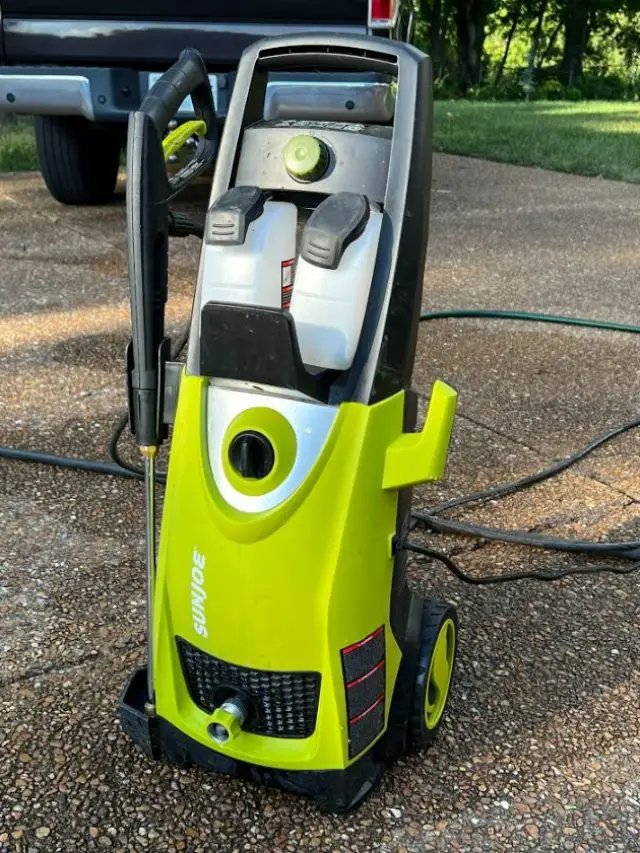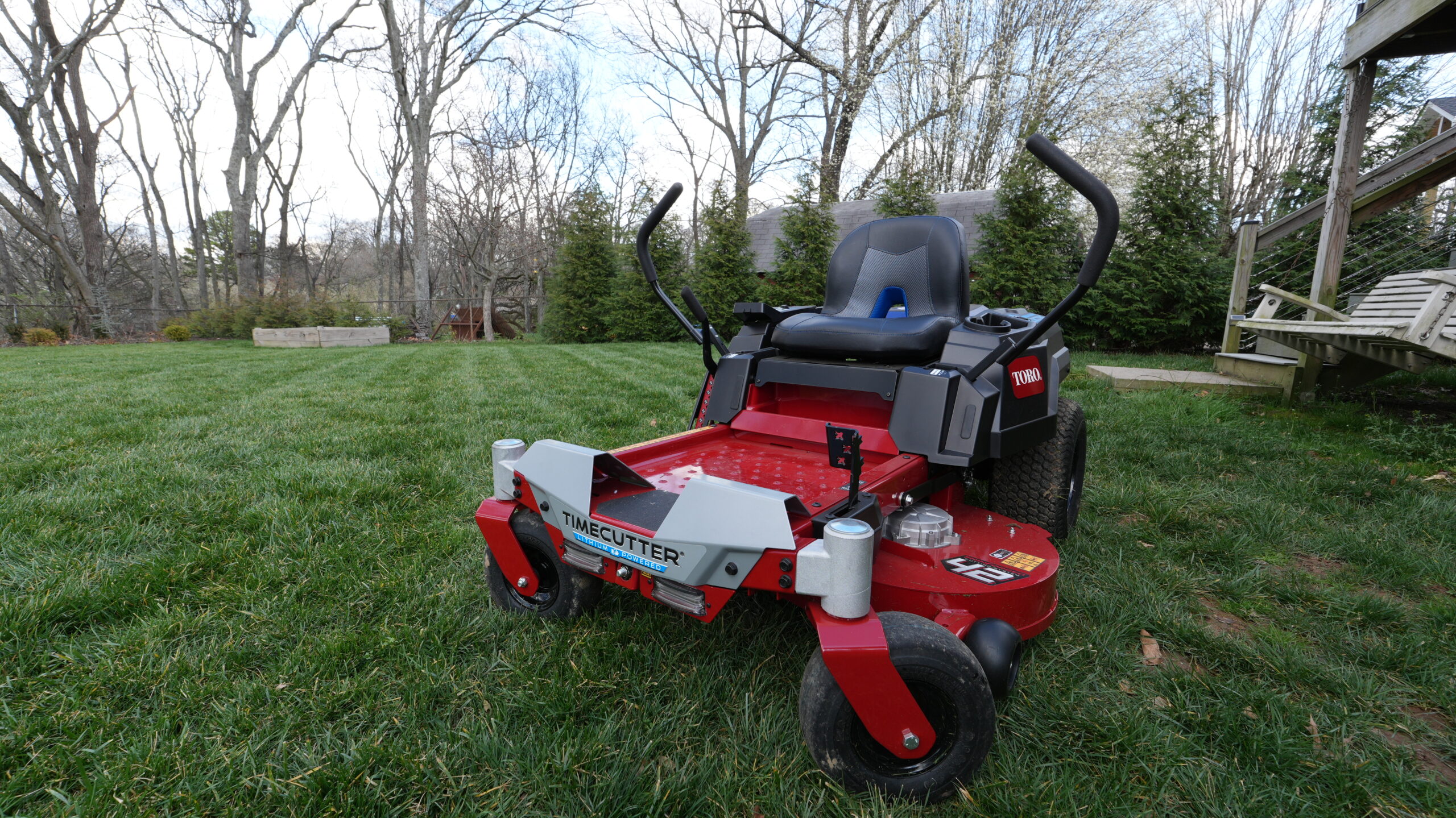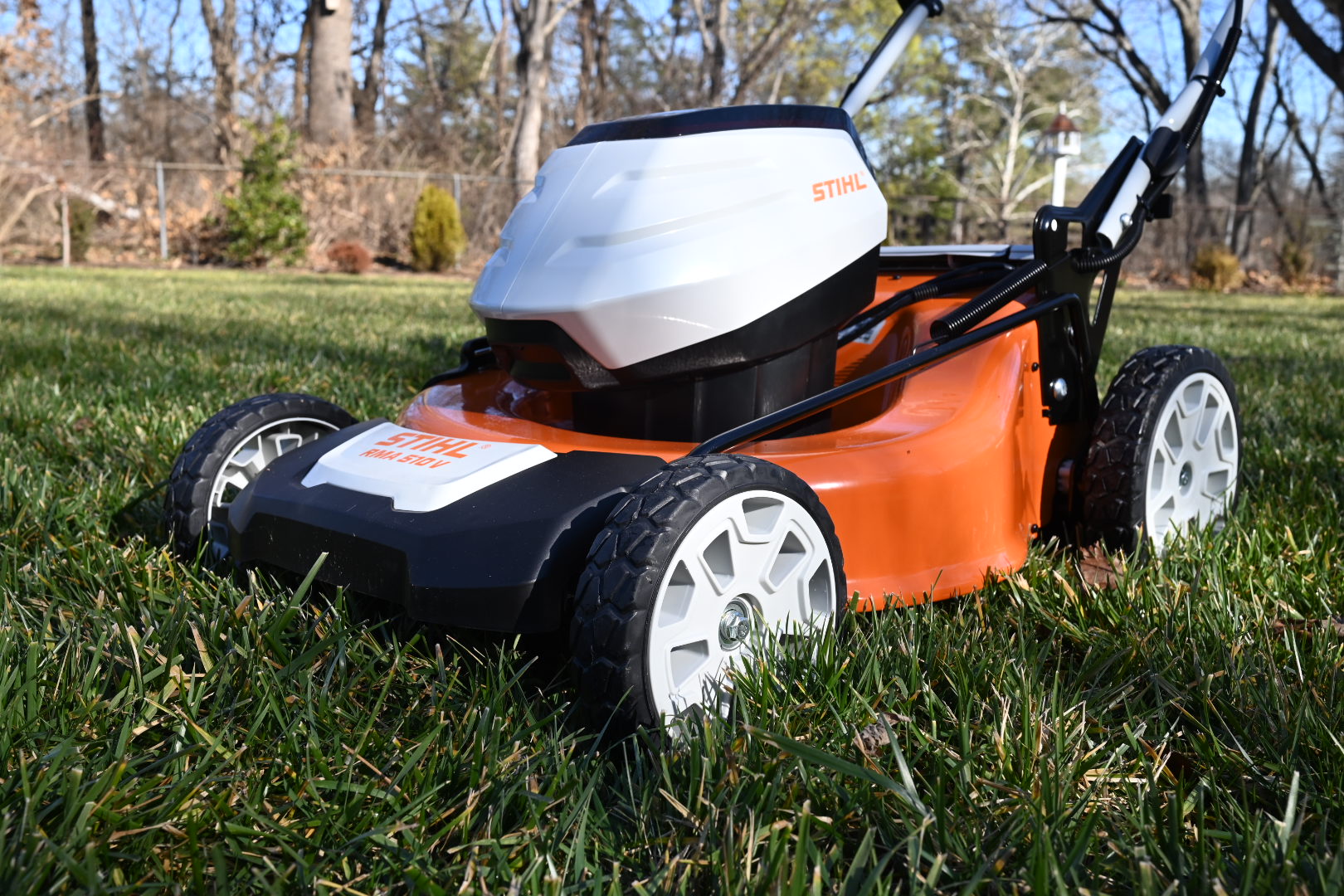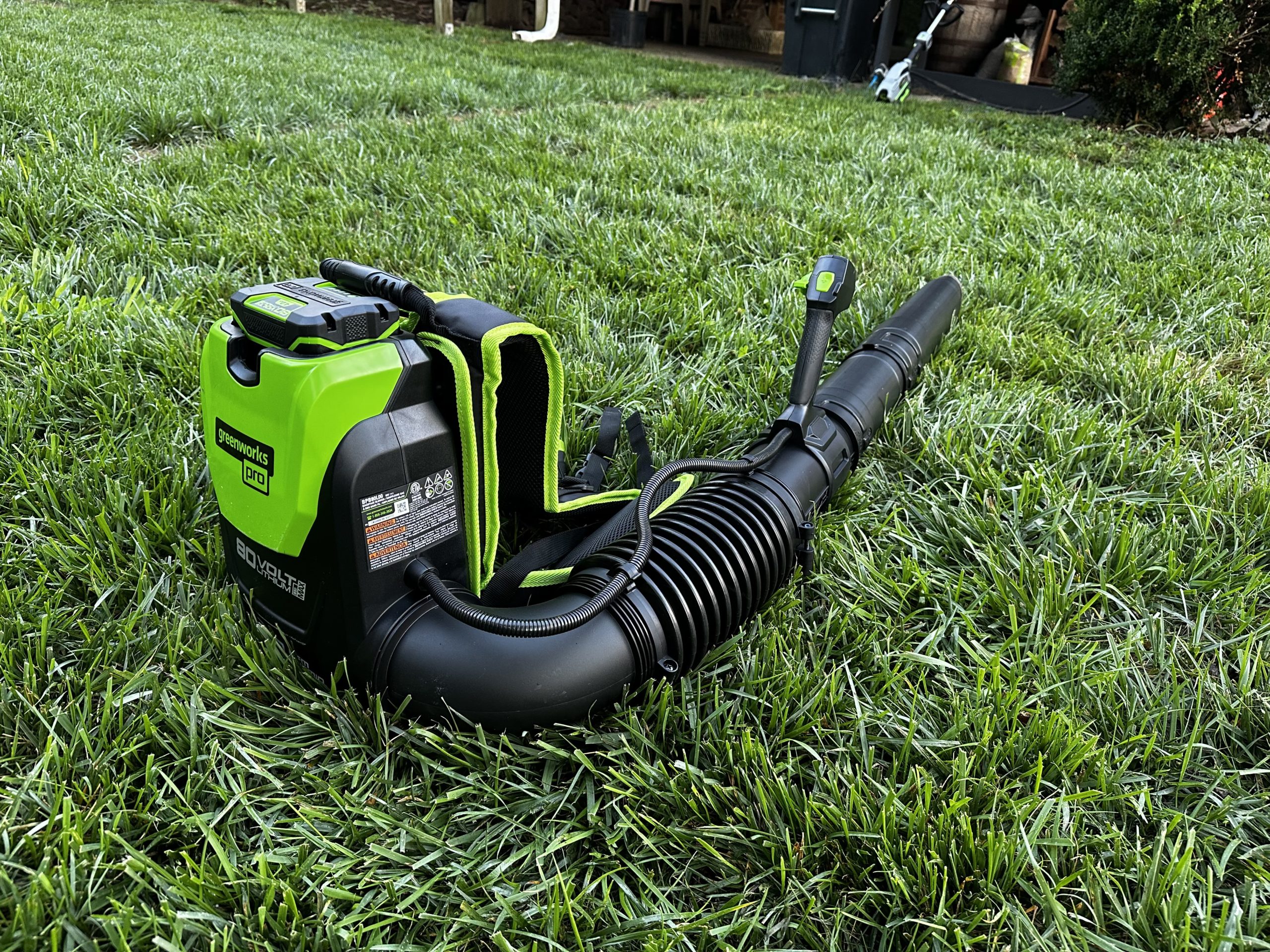Greenworks vs Ryobi pressure washer: two of the best selling electric pressure washers on the planet. Both make some bold claims about power and efficiency. I like the Greenworks pressure washer better because it has an extremely long warranty and durable build.
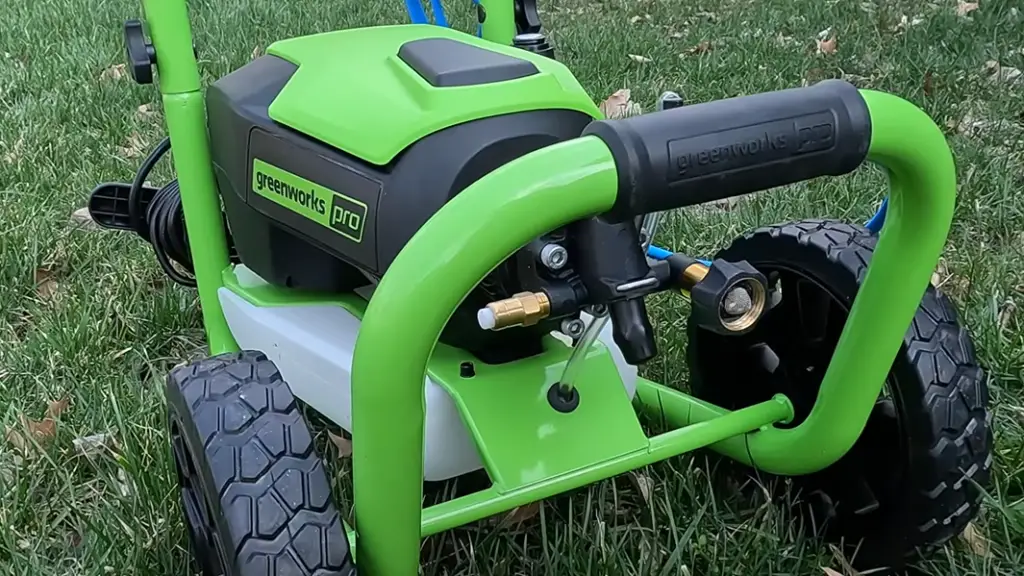
But as we all know, electricity and water don’t mix. One of these pressure washers is clearly better than the other and it isn’t immediately obvious. Both have good marketing departments, but with all the specifications thrown at you, it’s tough to tell who is telling the truth.
That’s where we come in. We’ve used both of these pressure washers (and dozens more) and put their claims to the test. Buckle up – it’s about to get brutally honest here.
Today we are going to put the Ryobi 3000 PSI pressure washer against the Greenworks 3000 PSI Pressure washer.
Jump ahead:
SPOILER: Winner is the Greenworks 3000 PSI pressure washer.
Want to read more? Check out the ultimate electric pressure washer buying guide.
Greenworks vs Ryobi Pressure Washer Comparison
The Greenworks 3000 PSI pressure washer and Ryobi 3000 PSI pressure washer must be the exact same thing, right? WRONG! They have similar PSIs, but we will soon learn how they are dramatically different. Here we go!
Power comparison: Greenworks vs Ryobi electric pressure washers
So as we mentioned earlier, pressure washer power has two metrics: gallons per minute (GPM) and pounds per square inch (PSI). GPM measures the volume of water and PSI measures the pressure. You ideally want both to be high to maximize both pressure and stream thickness.

The Ryobi 3000 PSI pressure washer advertises 3000 PSI, but also has 1.1 GPM. 3000 PSI is a great pressure and is competitive with even many gas-powered pressure washers, like some of these Honda pressure washers. At 1.1 GPM, you’ll find that the stream is extremely concentrated and pin-like. At higher GPM’s, the same PSI will be a thicker stream, even when a turbo nozzle or zero-degree nozzle is attached.

The Greenworks 3000 PSI pressure washer obviously also has 3000 PSI, but advertises 2.0 GPM. Upon further examination, the 2.0 GPM is when the pressure washer is only applying 100 PSI. So basically, when your hose is running. This is entirely unhelpful and honestly feels like a bit of fraudulent advertising. When it is operating fully at 3000 PSI, it has 1.1 GPM. Exactly like the Ryobi pressure washer.
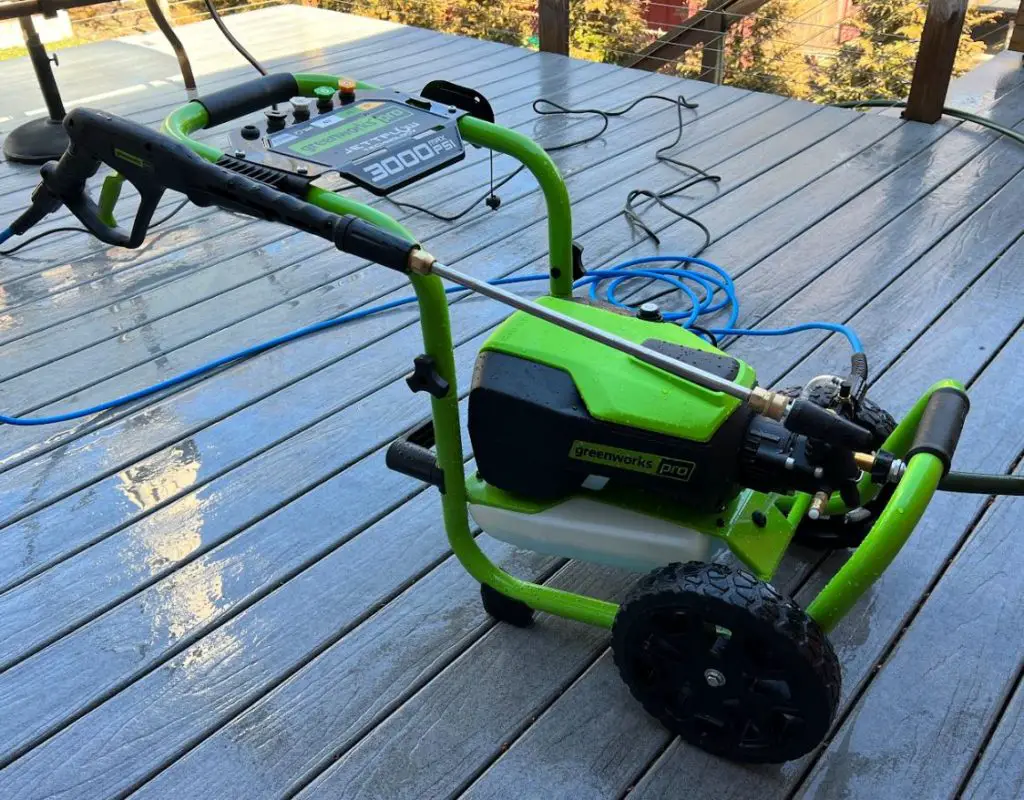
There’s simply no way to distinguish the two when it comes to pure power – they perform at the exact same levels, despite the tricky advertising by Greenworks.
Winner: It’s a tie between Ryobi and Greenworks!
Durability of the Greenworks and Ryobi pressure washers
A lot of folks don’t expect much from electric pressure washers, but they should. These things have evolved and grown in popularity because they are so much easier to use than gas-powered pressure washers. For starters (pun intended), they’re extremely easy to start. No cord pulling or oil mixing required. They’re way quieter and easy to maintain.
But I think a lot of people are still worried about mixing electricity and water. Fortunately, new premium electric pressure washers are made with brushless motors. Brushless motors provide much more torque, a cooler running motor, and a longer life than their brushed counterparts.
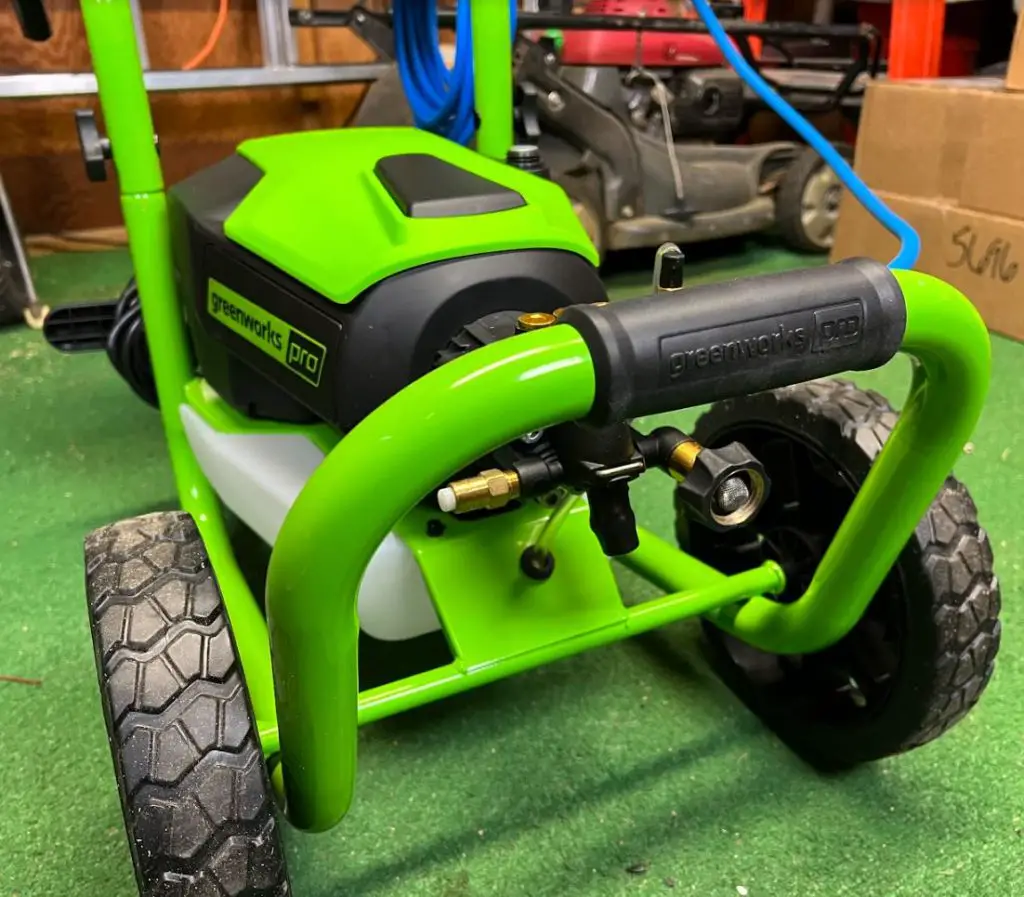
And you’re in luck if you’re choosing between the Ryobi and Greenworks 3000 PSI pressure washers as BOTH have brushless motors.
The cool thing about Greenworks’ brushless motor is that it has a patented TRUBRUSHLESS system that adjusts pressure and flow from the pressure washer to match the specific nozzle that is being used. Not sure how that works, but it’s a thoughtful approach that helps optimize the machine.
One other thing I like about the Greenworks 3000 PSI pressure washer is that it has a 10 year brushless motor warranty. That is INSANE! It’s also certified by the Pressure Washer Manufacturer’s association. Because they went way above and beyond to certify the life of this motor, I’ve got to go with Greenworks.
Winner: Greenworks 3000 PSI pressure washer
Bells and whistles
People buy electric pressure washers for a TON of different reasons. So they should come with a TON of different options. You don’t want to use the same nozzle on your driveway that you do on your car. Let’s see what Ryobi and Greenworks pulled together to make sure that this is a flexible machine.
Ryobi’s 3000 PSI pressure washer has the following extras:
- 5-in-1 nozzle + a turbo nozzle for ultimate flexibility
- Accessory storage built into the machine (nice)
- 35 foot hose so you can go further than others without moving the machine
- Soap tank (great for cars)
- 12 inch flat-free wheels that make it easy to move around
Greenworks 3000 PSI pressure washer has these bells and whistles:
- 5 nozzles (including a turbo like Ryobi)
- 25 foot hose (10 shorter than Ryobi)
- 35 foot power cord with inline GFCI (this is really cool because it helps you plug it in basically anywhere)
- 10 inch wheels
- Soap tank
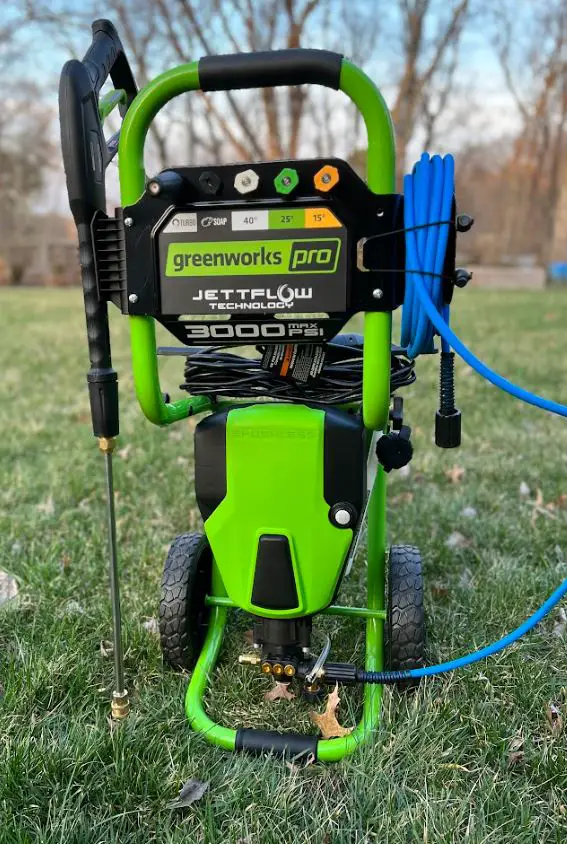
Both of these are great systems, but I really like the longer hose on Ryobi’s pressure washer as well as their 5-in-1 nozzle. Greenworks has a really cool power cord that doesn’t make plugging it in a bulky, annoying exercise.
Winner: Ryobi 3000 PSI pressure washer
Comparing the cost of Greenworks pressure washers to Ryobi pressure washers
Now that we’ve assessed all the different features of the pressure washers, let’s compare the cost. The Ryobi 3000 PSI pressure washer is available at Home Depot for about $450. Not bad.
The Greenworks one is available from their website for about $450, but is currently on sale for $399.
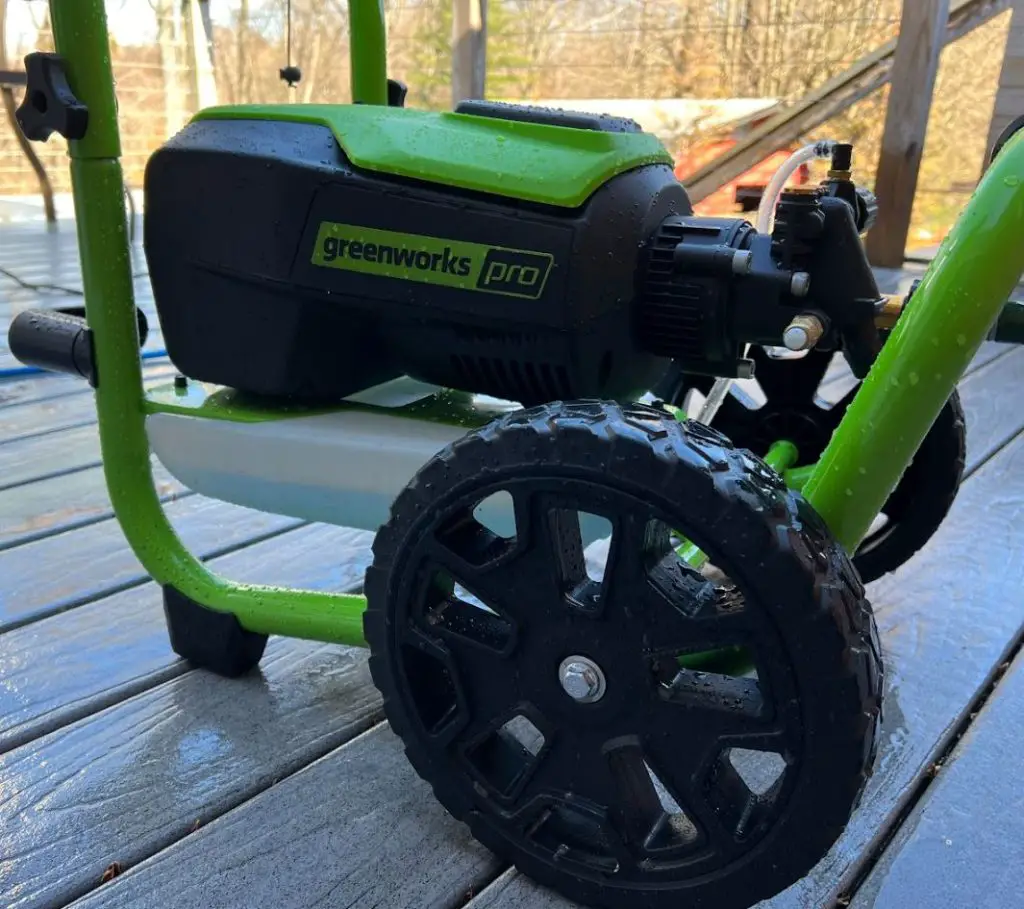
We don’t have an affiliation with either brand or store, so go wherever you like to buy pressure washers the best!
Final Review: Greenworks vs Ryobi pressure washer
Honestly, this one was a close race – neck and neck the whole way. Both brands have some premium equipment and both thoughtfully crafted their own pressure washer.
I like Ryobi’s bells and whistles as well as their honest advertising about power. With Greenworks, I like the sale price and the insane warranty on their brushless motor.
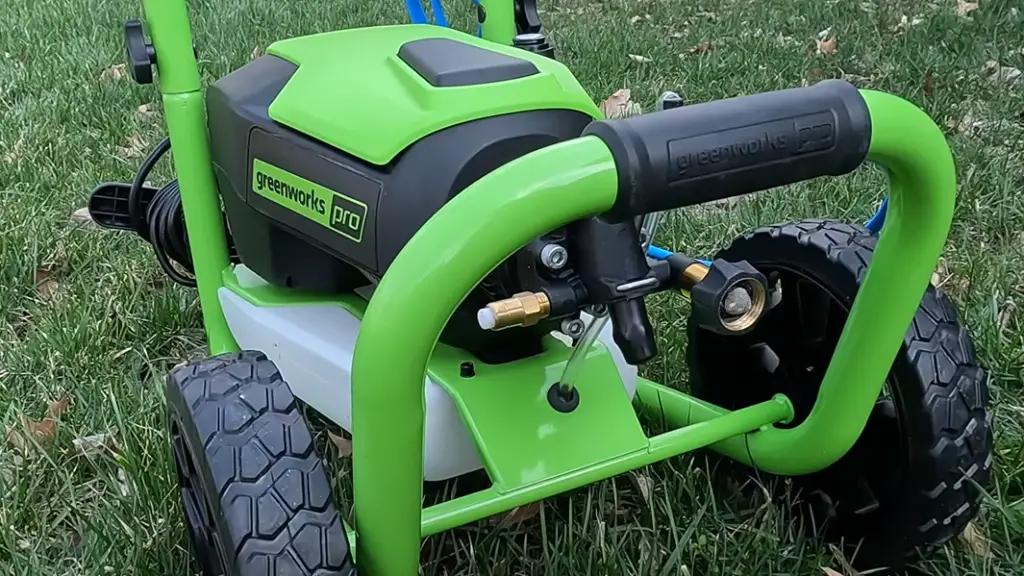
If I had to pick today, I would go with the Greenworks 3000 PSI pressure washer from Amazon. They have a good return policy, so if I didn’t like it I could take it right back.
Why we review lawn tools
The reason we started this website in the first place was because we had so much trouble trying to find reasonable, understandable, honest reviews for lawn equipment. And it’s not cheap! After hours and hours of research, trying products and returning them, and messing up our yards – we started this site.

As people who had to learn the hard way, we want you to know exactly what you are signing up for before you purchase a piece of equipment. That’s why we are committed to providing honest, easy-to-understand reviews that mean something.
What features to look for in a pressure washer
Both Greenworks and Ryobi electric pressure washers make it relatively easy to knock off one of the biggest must-haves on your list: a reliable and powerful engine. But there are a few other things we recommend truly making sure are available when searching for a new pressure washer – especially for home use.
Nozzles Matter
- When choosing a pressure washer, you should pay attention to the nozzles included in the package. Two types of spray nozzles are available, adjustable spray nozzles that can be controlled and quick-connect nozzles with predefined spray patterns.
- The predefined spray patterns typically come in different angles, allowing for you to quickly switch between a broad, lower pressure spray or a narrow, higher pressure stream.
- Quick connect nozzles are super convenient, but they’re almost like airpods – you can lose them!
Soap tank availability
- Additionally, you may want to consider a soap tank-equipped pressure washer. Some of these pressure washers have “foam cannons” where you can simply add some soap and it will mix it in with the water. Pretty cool.
- I recommend a soap tank for cars and windows.
Wheels on pressure washers
- Despite these seemingly minor features, they can have a big impact, especially with larger units. No sense in lugging around one of these in your yard and tripping all over the place.
- Some pressure washers have a tendency to flip over and be top heavy, so make sure the base is sturdy.
- If you’re on the job site, keep an eye out for never-flat tires that will protect the wheels in case there are spare nails laying around.
Hose types
- There’s a big difference between how easy or difficult it is to use a pressure washer based on the kind of hose that comes with it. Stiff, rigid hoses make it extremely difficult to have any maneuverability without messing up the job or knocking over the base.
- Length is also important for pressure washer hoses as you can end up in a tight spot, literally, if you don’t have enough reach.
- If you want a better pressure washer hose, check out our comparison of the top two pressure washer hoses, UberFlex and FlexZilla
GPM and PSI on electric pressure washers
GPM stands for gallons per minute. GPM measures how quickly water is leaving the end of the electric pressure washer. PSI stands for pounds per square inch and is a measure of pressure that is being applied out of the electric pressure washer.
If this is confusing to you, you’re not alone. In reality, if you are looking for power, you want both. They work hand-in-hand to deliver water from the machine at a high rate and effective and efficient volume.
For reference, a pressure washer can have a high PSI but a low GPM, meaning it is able to have a high pressure but generally not over a large area. Having both a high PSI and high GPM means that it’s coming out fast and it’s producing a more effective stream.
Likewise, you can also have a low PSI and higher GPM. This is a good ratio for cleaning cars because you get a lot of water at a safer pressure.
If you want a lighter duty pressure washer and need low PSI – check out a power cleaner we reviewed.

